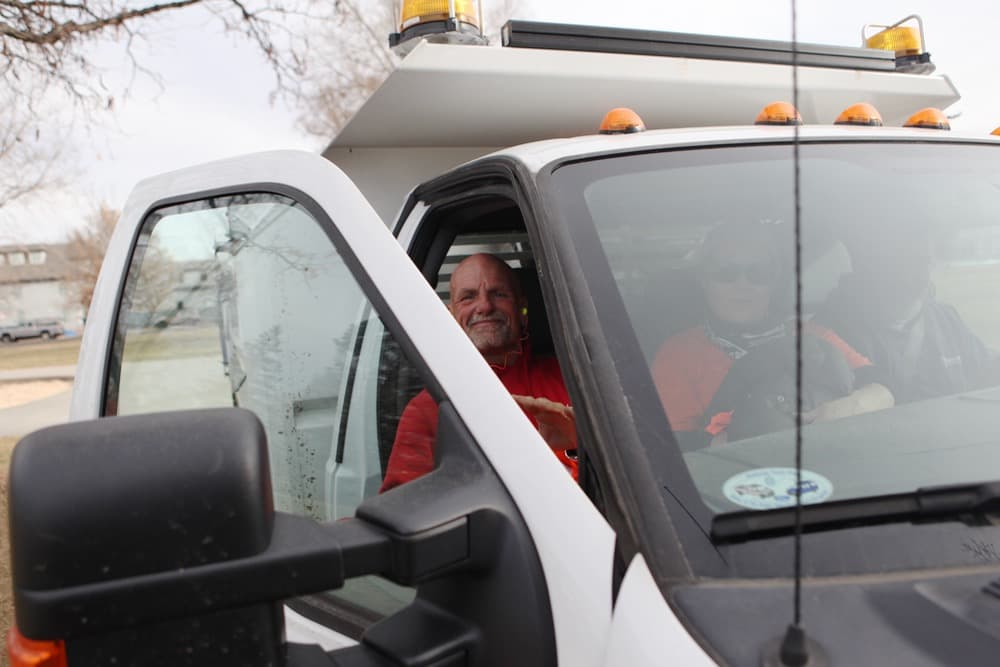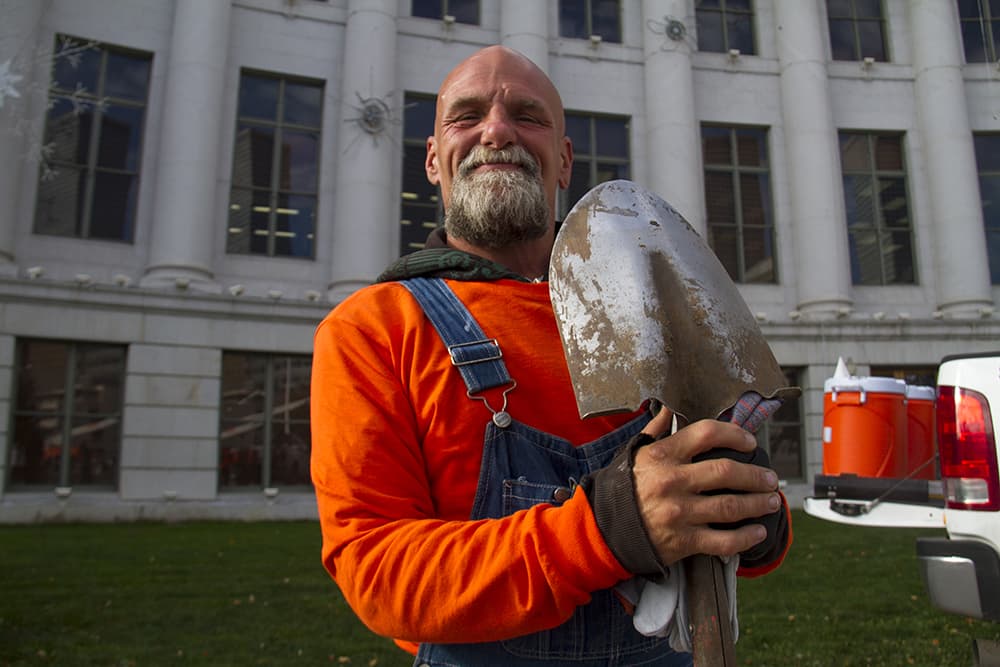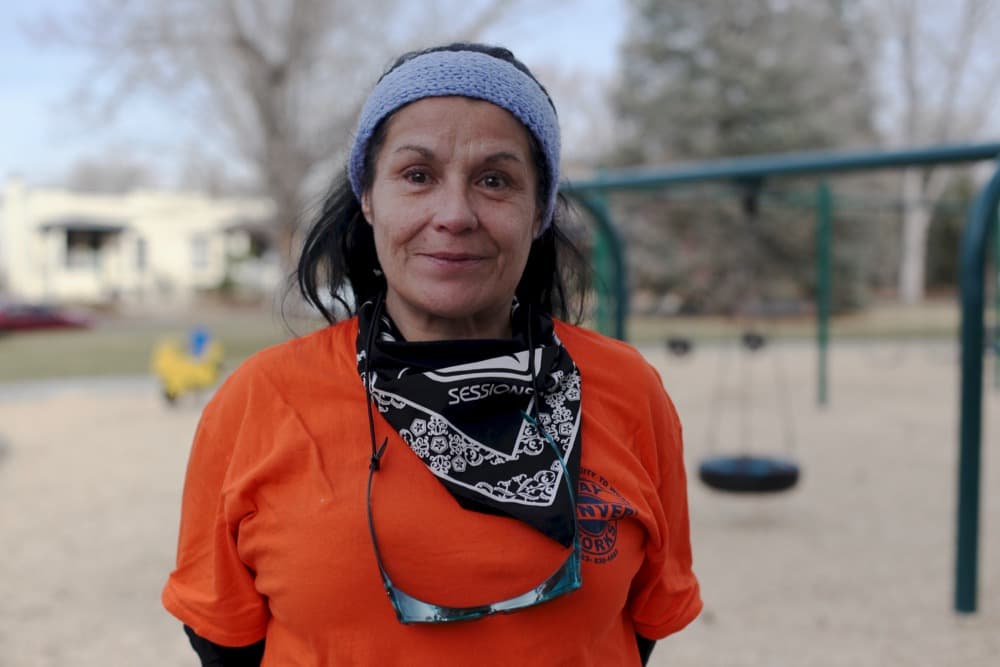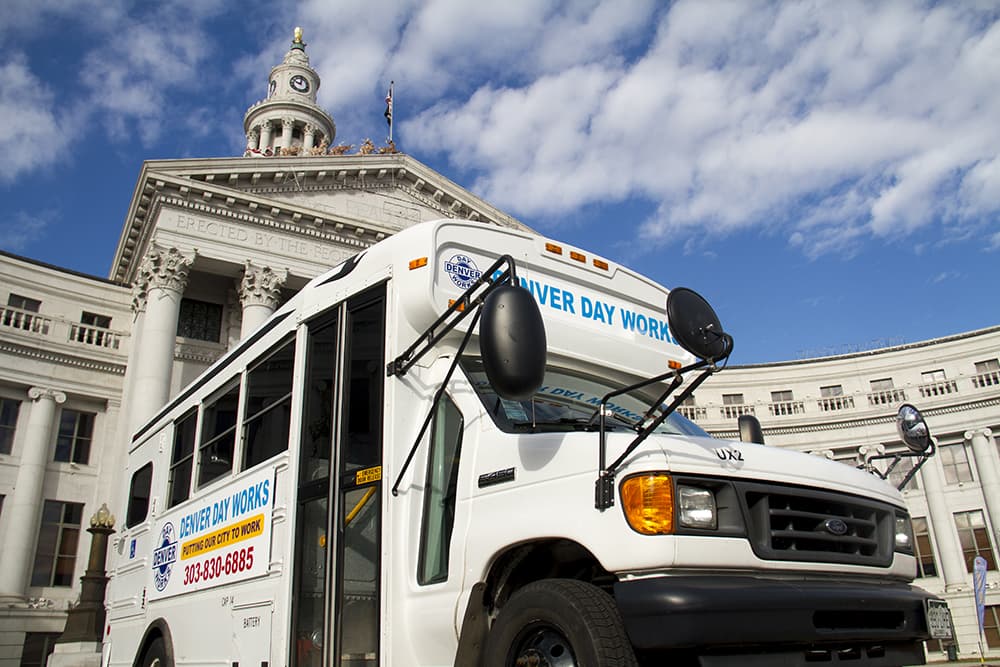
Danny Tims Jr. is having an unusual midlife crisis. Or maybe he's solving it.
"'Danny Tims, you're 50 years old,'" he said to himself -- and to me -- at Fuller Park on Thursday afternoon. "'Do you want to be homeless?'"
And then the compact, bald-headed man reeled off a colorful history of how he ended up as the face of one of the most unusual and interesting government homelessness programs in the country.
Tims is a "veteran homeless man," he said -- as in, someone who has been in and out of housing for decades. He has been an electrician and a construction worker and most recently a carnival hand.
He washed up in Denver earlier this fall with no money and no housing. He had hoped that Colorado's legal marijuana would keep him away from methamphetamine, his vice of choice. It has -- but he also somehow ended up with a full-time job for the city of Denver.

The 48-year-old is one of the first people to join Denver Day Works, a new program through which the city has been hiring people to work in parks and on other public property. Launched just over a month ago, DDW on Thursday was celebrating its first "graduations," as four of its early participants had just accepted 40-hour-a-week seasonal jobs with the city.
Now, we figured, would be a good time to check in with the workers and with academic experts about why this program just might work -- and what might hold it back.
There's a rarely acknowledged fact about homelessness.
Let's take Tims as an example. He has been fired or has quit jobs again and again. His problems -- as he describes them -- come from a combination of drug use, a short temper and a criminal record that includes numerous assault charges.
"I act before I think," he said.
Yet he has returned again and again to work -- and that's not unusual. In fact, all four Denver Day Works participants I talked to on Thursday -- two of whom had just been offered full-time work with the city -- had recent work experience.

Susan Gonzales, for example, walked away from a 10-year career at the U.S. Postal Service. "I think I'm having a mid-life crisis!" she exclaimed to me, putting her rake to the side for a moment. "I put myself here -- I did -- I've lived the cul de sac suburban life. I guess I did snap."
Rico Johnson, 27, said he's been homeless since 15, except for a few years in the U.S. Marine Corps. He came to Denver for legal weed and to escape the violence that has wrapped around his family in Memphis, he said.
Rita Roblevo, 54, said her disabilities have kept her out of work, especially since she was fired from a Goodwill store. She's in supportive housing, but her social workers encouraged her to seek out Denver Day Works to give her life some structure. Roblevo, along with Tims, will have full-time work through the winter.
"They hired me," she said. "They wanted me."
So, a lack of desire is not always the problem.
Denver Day Works already is running a waitlist of several weeks. I get emails regularly from people looking to join it. (I'd recommend calling the program: 303-830-6885.) Anyway...
"People who are experiencing homelessness are always looking for ways to make money," said Dennis Culhane, a University of Pennsylvania professor and one of the preeminent voices on American homelessness. "... Between a third and 40 percent have worked for wages in the last 30 days, according to one of the few studies we have."
One of the biggest problems, Dr. Culhane told me by phone, is that employers tend to exploit homeless people.
"Basically, if you find a homeless shelter of any substantial size in any community in this country -- turn around and within one square block of that area you’re very likely to find a day labor company that is there to exploit these folks," he said.
These companies often operate as temp agencies, according to Culhane, paying bare-minimum wages and rotating their workers constantly through different assignments to ensure they never get a shot at progress.

Is Denver Day Works any different?
Like other low-income employers, Denver Day Works is getting the poorest people to do jobs that otherwise are going unfilled. For example, Denver Parks and Recreation had 60 fewer seasonal workers than it really needed last year, according to deputy director Scott Gilmore.
“We can’t fill positions,” he said. They'll be doing fairly low-skilled work at first, from spreading mulch to planting trees.
The difference, though, is that Denver's program intends to do it more responsibly. It pays $12 an hour for the temporary shifts, and $11 an hour for those moving on to 40-hour-a-week jobs. (The temporary shifts are capped at 50 hours and $600.)
It's also administered by people who are expressly assigned to make sure people succeed, while exploitative day labor programs intentionally ensure their workers can never progress. Eventually, the Denver program hopes to connect people with higher-paying, higher-skilled jobs, from HVAC maintenance to files administration.
"The value of this type of operation is that it’s bringing a not-for-profit player into the space, who does not have the same incentive to get as much profit from these workers as they can, but who may have a recovery or reintegration attitude toward employment," Culhane said.
Tims, for example, was able to get a housing voucher through the program's connections, and he's hoping to move into an affordable apartment soon. (A city employee even spotted him the $25 application fee.) The participants “can be an asset to the city, but we’re also providing them a way back into society," Gilmore.
"That's love," Tims said. "I'm pretty tough -- but you've always gotta have help."
This is a shockingly unusual idea for how simple it is.
Denver's $400,000-a-year program (more details here) was inspired by a similar, smaller effort in Albuquerque, and the city of London also offers training in jobs like shoe-shining. Otherwise, very few governments have gotten into the business of directly employing homeless people.
These programs show an evolution in the way we think about work, according to Kristin Ferguson, associate professor of social work with Arizona State University.
Previously, she said, the tendency was to "warehouse" people with various disabilities and illnesses, shutting them away in "sheltered workshops." Those early work programs did little to prepare people for work beyond the warehouse, she said.
"They would make trinkets and never sell the trinkets. It was kind of a demeaning and belittling experience for everyone involved," she said. Beginning in the 1970s, she said, psychiatrists and psychologists turned this approach on its head.
They created the idea of "supportive employment," Dr. Ferguson explained. Instead of creating "training" jobs, supportive employment is about launching people straight into regular work, while giving them services that might help them succeed. That can be more expensive than hiring a "typical" worker, but it also has the potential to get people off the streets, out of jail and out of hospitals.
"Let’s get you working, and we’ll concurrently address all the life challenges that you are experiencing," Ferguson said.
Will it stick?
The city estimates that 300 people will enter the program in its first "pilot" year -- just a small portion of the homeless population -- and that far fewer will end up working jobs for any extended time. Its budget of $400,000 is just a tiny fraction of the city's nearly $2 billion of annual spending.
In other words, this program will not be getting people off the streets of Denver in any large numbers, and different strategies will be necessary for different people.
There's also the question of how many people, like Tims, will be able to find housing once they have a job and how effective the city's health services will be in helping them to minimize drug and psychological health issues.
Meanwhile, the city will take continuing criticism for its practice of sweeping people from sidewalks and other public spaces.
But for these few so far, this program seems to offer some genuine hope.
"I can plan things now," Roblevo told me. "I can see the light at the end of the tunnel."
Johnson put it this way: "I had plenty of opportunities to do right. I'm trying to change my environment -- where I'm from."
Gonzales, who gave it all away: "I have changed my mind, and I'm ready to do it."
And Tims: "I was just homeless last week. I got a job with the city parks and recreation. You've got to be kidding me."










